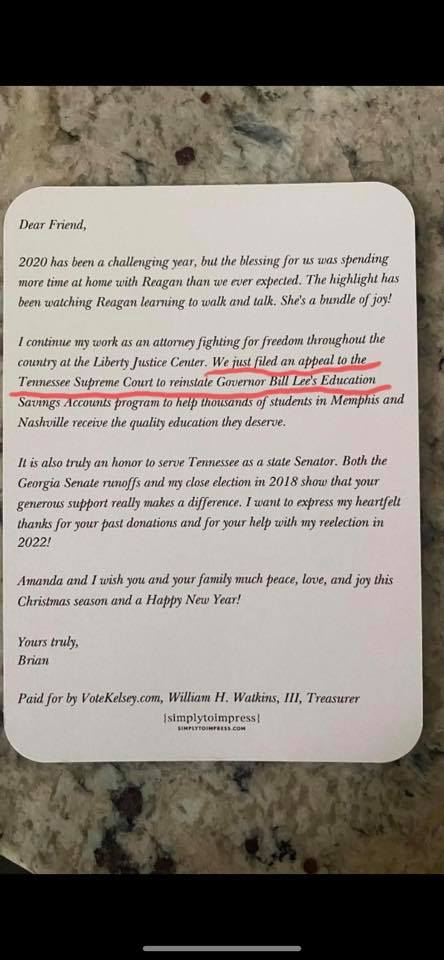Tennessee’s “Mr. Voucher” State Senator Brian Kelsey sent Christmas greeting cards with a grinchy message about his non-stop work to privatize Tennessee’s public schools. Apparently, even the “Season of Giving” is one where Kelsey spends his time thinking about how to send taxpayer money to public school privatizers.
Here’s that fun card:

Of course, public school advocates are fighting back, asking the Supreme Court not to hear Kelsey’s appeal. It seems Kelsey’s just mad because after doing all that work to help Gov. Bill Lee pass a voucher scheme, the Tennessee courts have repeatedly held the law to be unconstitutional.
Parents Fight Back
Here’s a press release from the group Public Funds for Public Schools:
Parents of students in the Nashville and Memphis public schools, who are plaintiffs in a lawsuit challenging a state law imposing a private school voucher program on their counties, have told the Tennessee Supreme Court there is no basis to review lower court rulings striking down the voucher program as unconstitutional.
In 2019, the Tennessee legislature passed, by a one vote margin, a law to divert funding from the already under-resourced public schools in Shelby (Memphis) and Davidson (Nashville) Counties to private schools through an “education savings account” (ESA) voucher program. ESA vouchers are used to pay private school tuition and other private education expenses.
Two lawsuits were promptly filed to challenge the voucher program, one by Shelby and Davidson Counties and the second by public school parents and community members in those counties.
The plaintiffs in the second lawsuit, McEwen v. Lee, are represented by the Southern Poverty Law Center and Education Law Center, partners in the national Public Funds Public Schools campaign, as well as by the American Civil Liberties Union of Tennessee and pro bono by the law firm Robbins Geller Rudman & Dowd LLP.
In May 2020, Chancellor Anne Martin of the Davidson County Chancery Court found that the voucher law violated the home rule provision of the Tennessee Constitution, which prohibits the general assembly from passing laws applicable only to specific counties without local approval. In September, the Tennessee Court of Appeals upheld Chancellor Martin’s ruling, concluding that the trial court had applied well-established precedent in determining the voucher law violated the constitution’s home rule protections.
The defendants in the litigation, led by Governor Bill Lee and joined by pro-voucher groups, have now asked the Tennessee Supreme Court to take up the case. The McEwen plaintiffs have moved to file an amici curiae brief urging the court to reject the appeal.
The brief argues against Supreme Court review of the voucher law for three reasons:
- The public interest would not be served because private school vouchers have racist origins; voucher programs increase racial segregation; research evidence demonstrates vouchers harm the education outcomes of students who use them; and vouchers drain money from underfunded public schools serving the vast majority of students.
- There is no constitutional duty to fund vouchers. Establishing and funding a private school voucher program is not within the state’s power and duty under the Tennessee Constitution’s education clause and, therefore, does not implicate a state function at all.
- The voucher law is not a “pilot program” and has no impact on the state’s ability to improve education through innovative or pilot programs, as long as they comply with all provisions of the constitution.
“If the voucher law had not been struck down, tens of millions of dollars would have been diverted from the budgets of the Memphis and Nashville public schools in the current year alone,” said Jessica Levin, ELC Senior Attorney and Director of the PFPS campaign. “Because the program would automatically increase in size each year for five years, it’s crucial that the lower courts’ rulings invalidating the law are not reversed.”
In this extremely challenging time there is a critical need to increase funding and resources to public schools to address the impacts of COVID-19 on students and families. In addition to the Tennessee litigation, PFPS’s work over the past year has prevented hundreds of millions of public education dollars from being diverted to private schools.
Read more about PFPS litigation here and access additional information about McEwen v. Lee here.
Three Sizes Too Small?
In a year that has seen a devastating pandemic and a Governor who has done nothing to lead, Kelsey simply won’t stop fighting to take from our public schools and their students. We’ve seen cuts to a planned teacher raise and a stubborn insistence on state testing. Now, Brian Kelsey wants you to think about vouchers as the Holidays approach.

For more on education politics and policy in Tennessee, follow @TNEdReport
Your support – $5 or more – makes publishing education news possible.
